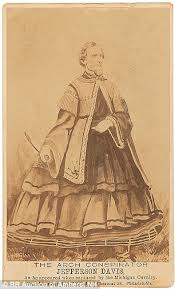Jefferson Davis’ reputation will forever be tainted by foolish innuendo.
Jefferson Davis: CSA’s Flawed Leader
The Confederate president was a man of polarities. Jefferson Davis (1808-1889) had some excellent character traits. He was a courteous and surprisingly generous Southern gentleman. He was steadfast and loyal. He was a man of unflinching personal courage and integrity. He was tireless in whatever he undertook. He was a compelling speaker, and a voice of reason.
On the flip side of that coin, his unfailing courtesy was perceived to be aloof and cold; his loyalty became favoritism; his integrity, unbending rigidity.
He rose to political leadership quickly and steadily. As a protégé of his personal hero, John C. Calhoun, he was assimilated into the world of movers and shakers of Washington from the start. As a bona-fide hero of the Mexican War, the West Point-trained Davis became a major figure in his home state of Mississippi. As a former son-in-law of President Zachary Taylor, the widowed (and remarried) Davis had family access to the White House. And as the capable Secretary of War under Franklin Pierce, administrative skills only added to his impressive resume.
Jefferson Davis: The Confederate Presidency Calls
By the late 1850s, Jeff Davis had become the “Voice of the South.” He spoke often and passionately against secession, realizing from the start that it could not succeed without a bloody war they were unequipped to fight. Conversely however, he was a firm proponent of states’ rights, which included the Constitutional right to secede.
He was considered a moderate; a man of reason in the South, and a far cry from some of its rabble-rousing fire-eaters. His unanimous election as Confederate President was no surprise but his acceptance was not without trepidations.
As he long suspected, the Confederacy would prove to be a major headache. Just as the states’ rights leaders rebelled against perceived Northern control, they held firm against Confederate control, which Davis knew was essential if they were to have their own “country.” His hands were full, and usually tied trying to unite eleven separate “countries.” If the state governments were unruly, the Confederate military hierarchy, most of whom he had known personally for decades, were even more cantankerous. Davis was in the middle of everything, with little of Abraham Lincoln’s humor or political skills.
Jefferson Davis: The Fall of Richmond

Jefferson Davis had sent his wife and their four children South shortly before Richmond fell. His meeting up with them later was purely accidental; he did not know where they were.
For four arduous years, Jefferson Davis tried to hold the Confederacy together, but outnumbered, outsupplied and exhausted by war, their “country” was dissolving. Davis pledged that as its President, he had a solemn obligation to preserve whatever fragile elements were possible. He made arrangements to escape Richmond in early April, 1865, and form a capital-on-wheels, continuing the fight as best as possible.
For nearly three weeks, with on-again, off-again military escorts, Davis traveled south and east, to find a ship to take him to relative safety. He also needed to reunite with his wife and four children under ten who he had dispatched South a few weeks earlier.
Jefferson Davis: The Raincoat Affair
Completely by accident, Davis encountered his family and their small party of escorts three weeks after Robert E. Lee had surrendered at Appomattox Court House. Lincoln had been assassinated. Davis, who had learned of the assassination only recently, quickly realized that he was a wanted – and hunted – man. He was also prepared for his fate.
Jefferson Davis was fifty-seven years old in April, 1865. He was gaunt, blind in one eye, and in chronically poor health. Any escape attempt would be weak, with little physical resistance. But he was still President of the Confederate States of America, and he had an obligation to make the effort.
Coincidentally, Union soldiers were closing in by accident as well. They were completely unaware that their prime target was under their very noses.
It had been a damp and rainy spring, and Davis’ health, always iffy, was prone to chill. As he tried to slip unnoticed into the nearby woods, he picked up his wife’s oilcloth raincoat by mistake. Both Jeff and Varina Davis had identical mackinaws, and Varina was a large woman, nearly as tall as her husband. She hastily threw a shawl over his head for added warmth, as he quietly approached the nearby trees.

The cartoonists had a field day describing the ex-Confederate President trying to escape in “his wife’s clothing.”

The fact that he had picked up his wife’s raincoat made no impression on the newspapers: “His wife’s clothing” was the important part.
The soldiers quickly caught up with the aging man who did not resist. In their ensuing written reports, Union soldiers noted, almost parenthetically, that Davis was wearing his wife’s clothing. That it was merely a raincoat picked up by accident was of no matter. “His wife’s clothing” made a titillating story. The newspaper cartoonists had a field day. The papers and magazines all had drawings of ol’ Jeff in hoopskirts and pantaloons. And what the papers said, the people believed. They wrote songs about it. Showman P.T. Barnum was even eager to buy the clothes purported to be the ones Davis was wearing when he was captured.
Jefferson Davis: Perpetuating the Story
Jefferson Davis spent two years imprisoned in Fortress Monroe. He was finally released on bail, but never brought to trial. Despite his poor health, he lived to be eighty-one. Confederate Civil War veterans would vilify him and extol him – depending on what mood they were in at the time. He would become their Symbol of the Lost Cause, but General Robert E. Lee would be their hero.
In the North, however, the story of Jefferson Davis escaping in his wife’s petticoats continue to this day. He would refute the story privately, but he had the soul of a martyr. His public facade would not permit him to stoop to that level of indignity.
Ridicule, rumor and innuendo sometimes can do more damage than anything else, and in this case the poisoned dart had hit home. The essence of the story was undoubtedly false, but it was perceived to be true. It created a life of its own.
Sources:
Johnson, Clint – Pursuit – Citadel Press, 2008
Swanson, James – Bloody Crimes: The Chase for Jefferson Davis – William Morrow, 2010



And so, the news cycle continues. Innuendo carries more weight than fact. sd
Always has, always will. – fsf